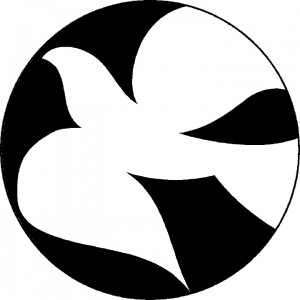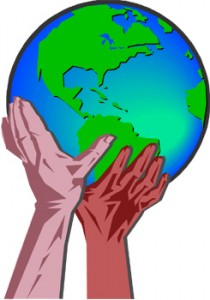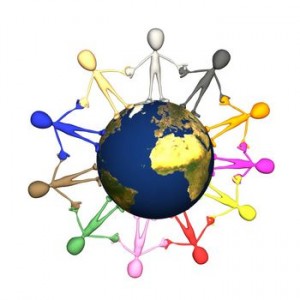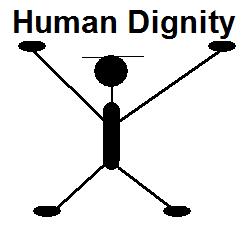When we promote cartoons that mock an individual religion, race, gender, or ethnicity, are we mocking them – or mocking human dignity?
In April 2010, a controversial U.S. comedy television cartoon “South Park” censored one of their broadcasts which was to include a cartoon of Muhammad along with other religious figures in their cartoon, after receiving threats from the New York blog “Revolution Muslim.” As a response to the South Park censorship, one cartoonist, Molly Norris, came up with the satirical suggestion to make May 20 as “Draw Muhammad Day.” Molly Norris was shocked that people took her “joke” seriously, and planned to indeed hold a “Draw Muhammad Day” on May 20; Ms. Norris has since called for this to be canceled, but some still plan to do this.
Despite the predictable offense to Muslims, a number of cartoonists have done cartoons of Muhammad and Muslims. Cartoons of Muhammad have been done and published by Swedish artist Lars Vilks and by Danish political cartoonist Kurt Westergaard. There has been an extreme reaction to these (and other) cartoons. Lars Vilks was recently assaulted during a lecture on free speech in Sweden, and was the target of a transatlantic murder plot that including two American women promoting violent jihad. In January 2010, Kurt Westergaard’s home was broken into by a man with an axe and a knife. Both have received numerous death threats. There have been numerous threats and protests by Muslims offended by cartoon of Muhammad. Such outrage is not limited only to violent extremists, as many Muslims view images of Muhammad to be disrespectful to their religious views.
Nor is such outrage limited to individuals and groups. On April 15, 2008, the Pakistan National Assembly passed a resolution to urge the United Nations to support an international death penalty for those responsible for such cartoon “blasphemy.” This Pakistan National Assembly session was attended by Pakistan Prime Minister Gilani, “who arrived moments after the passage of the resolutions.” So while it may be comforting to only subscribe such concerns to a few “radicals” in groups like “Revolution Muslim,” clearly there is a broader group around the world who find such cartoons outrageous enough to warrant “capital punishment.”
In the West, there have been a number of articles on this subject by Muslim authors, explaining why Muslims are offended by such cartoons. On Muslim author, Shahed Amanulla, decries the idea of “Draw Muhammad Day” as “Collectively Punishing Muslim Americans.” Another Muslim author, Zahed Amanullah, states that while he is offended by such cartoons, “For many Muslims, pointing to a cartoon, a teddy bear, or a voodoo doll and saying it’s the prophet, doesn’t make it so. We know better than to worship them.” Mr. Amanullah clearly states that there is diversity of opinion on this subject among Muslims.
Public comments to such articles by Muslim authors often complain that they don’t sufficiently defend our human rights of freedom of expression. So I am writing this from the perspective of a non-Muslim supporter of our universal human rights, with a statement on our responsibility for human dignity, a message to non-Muslim readers, and a message to Muslim readers.
Human Rights and Responsibilities include Human Dignity
Does our human rights include the “right” to be offensive? Yes, they do. But along with our rights also come responsibilities that are inherent in any shared society. That includes the responsibility to also defend each others’ human dignity. Such commitment to human dignity is a fundamental part of the Universal Declaration of Human Rights, signed by the United States of America and other nations of the world.
Article 1 of the Universal Declaration of Human Rights reads: “All human beings are born free and equal in dignity and rights.They are endowed with reason and conscience and should act towards one another in a spirit of brotherhood.”
Human dignity is also recognized in the preamble of the Universal Declaration of Human Rights which recognizes “the inherent dignity and of the equal and inalienable rights of all members of the human family is the foundation of freedom, justice and peace in the world.” The signing of the Universal Declaration of Human Rights on December 10, 1948 by the nations of the world included a statement that the United Nations recognized such rights as part of their respect “in the dignity and worth of the human person and in the equal rights of men and women.”
The Universal Declaration of Human Rights was created in the aftermath of Adolf Hitler’s Nazi Germany, a nation that brought crimes against humanity to a level not previously witnessed by mankind. But one of the Nazis’ first tool to degrade and attack human dignity was Julius Streicher’s Der Sturmer newspaper created in 1923; Streicher was inspired to join the Nazi party after hearing an Adolf Hitler speech in 1921.
From 1923 through the end of Nazi Germany, Der Sturmer (“the Attacker”) was a publication that attacked the humanity and dignity of Jews in Germany and around the world, using “cartoons.” The notorious Der Sturmer cartoons were historically significant in spreading images to degrade Jews and portray them as enemies against Germans and all of humanity. The Der Sturmer anti-Semitic newspaper and cartoons were used to spread hate against Jews throughout Germany among the common man, and were distributed to Germans in countries around the world. The Calvin College states that the distribution reached over 2 million readers at one point. Along with the cartoons degrading and spreading hatred towards Jews, Der Sturmer’s fevered pitch of hate against Jews called for extermination of the Jewish people, for which Julius Streicher was tried and convicted of war crimes. The Nuremberg courts that convicted him warned of “the poison that he has put into the minds of millions of young boys and girls will continue on for years to come, since he concentrated so much of his hatred for the Jews.”
Anyone who has seen the Der Sturmer cartoons and articles can readily see the truth in this. Jews were caricatured in hateful ways that did not end with Nazi Germany. The hate cartoons by Der Sturmer and others sought to degrade, dehumanize, and strip the dignity from Jews. Yet the Der Sturmer hate cartoons remain alive on the Internet, and are part of the root web site of the “white nationalist hate group” Stormfront in America. In America, the Der Sturmer cartoons are viewed as part of our freedom of expression – despite all the horrors that they contributed to.
How can humanity not have learned its lessons after seeing the consequences of demonizing and degrading identity groups in Nazi Germany? But we know it did not and has not. Even as the United States of America was signing the Universal Declaration of Human Rights in 1948, offensive cartoons continued to appear and have continued to appear over the decades — especially about black Americans.
Nor have such offensive cartoons been limited to only “fringe” organizations, or relegated only to distant history. Racial caricature cartoons of U.S. Secretary of State Condoleezza Rice have appeared in the Washington Post and many other publications. The parade of racial caricature cartoons of President Barack Obama have been in many places.
Iran has hosted an International Holocaust Cartoon Competition of its own for those who deny that the Holocaust took place. In many parts of the Arab press (as well as the Western media), anti-Semitic cartoons degrading and dehumanizing Jews and Israeli leaders have been commonly published for many years.
There seems to be no end of ways to create offensive cartoons about any race, religion, gender, or national origin. Mocking the human dignity of others in offensive cartoons depicting men, women, children seems to be the great equalizer of those promoting disrespect and some cases, outright hatred. Still, offensive cartoons have been defended by our freedom of expression.
We respect such universal human rights. But we also recognize, as did the United Nations in their Universal Declaration of Human Rights that all human beings are also equal in dignity as well. Such human dignity is not just a right, it is also a responsibility.
A Message to Non-Muslim Readers
Cartoons about Muhammad has caused an outcry of indignation by offended Muslims, especially in Muslim majority nations. To non-Muslim readers, I am aware that one of the main reasons for the continued popularity of cartoons about Muhammad and Muslims to some non-Muslims is a defiance to those telling you that you are not allowed to do this. The perspective is “I’ll show them what I can and cannot do. I’ll show them about how they seek to silence my freedom of expression.” People like to win arguments, and they don’t like being told what they can and cannot express. But there is also a point at which your reason must also win over your emotions of frustration.
There are many things that we are “free” to do, but we do not do out of respect for others, as part of civil society, and to peacefully co-exist. We are free to spit on our neighbor’s lawn, but if we want to be good neighbors that live in peace, we do not. Do you feel deprived, censored, from not offending your neighbor? Of course not. You know better. You have to live together.
But when it comes to cartoons about Muhammad and Muslims, such reason seems to disappear. Some seek to demonize Muslims in cartoons to prove their “freedom of expression.” What do you really think you are accomplishing by offending Muslims? Do you think that demonizing Muslims will impact religious extremism or extremism? What minds do you think contempt will change? What hearts do you think disrespect will reach?
Some non-Muslims are simply angry, tired of being threatened, and want to “strike back” at religious extremists by targeting all Muslims. Have you considered that by seeking to offend all Muslims to get back at religious extremists that you have judged all Muslims as one, singular monolithic group that must all think and believe the same way? How different is it for non-Muslims to condemn all Muslims than it is for Muslim religious extremists to condemn all non-Muslims unequivocally?
In your anger and frustration, aren’t you becoming exactly what you seek to condemn?
What really infuriates many of you is the inconsistency on public condemnations of offensive expressions. This is especially the case among many Christians, whose images are regularly defiled and disgraced in art galleries, national television, on the Internet. Some believe that “well, if our religious views can be mocked, why can’t theirs?” But you also know “two wrongs don’t make a right.” Christians also are commanded to love their fellow human beings. Currently a popular anti-Islam website has an image of the cartoon character “Calvin” urinating on the Qur’an. It is no small irony that the image is simply a Photoshop modification of the cartoon character “Calvin” urinating on the Christian cross, or anything else someone respects.
You can choose to be different from those whose actions outrage you, or you can choose to be no different. Which choice do you think will gain you credibility in the world? Have we learned nothing from humanity’s history of living together?
A Message to Muslim Readers
To Muslim readers, it is reasonable to expect respect and human dignity. It is reasonable to expect that your religious views and images are not offended. Such human dignity is both a right and a responsibility. However, we must all recognize that statements and images that we merely view as offensive are not a crime. We may view such images and comments as disrespectful, contemptible, but we also know that “two wrongs don’t make a right.” While the majority of the likely Muslim readers are no doubt stating, “of course, I know that,” the reality is that in many parts of the world (including in the West), there are those who continue to seek to punish “blasphemy” with capital punishment – either legally or by taking the law into their own hands and claiming they are divinely guided.
To challenge such views, it is essential that more Muslims are visible to the public in supporting our unqualified, universal human rights, and are visible to the public taking exception to those who would defy such freedoms. We need more public demonstrations of our shared commitment for human rights, pluralism, and dignity – and not just on the Internet or in conference rooms, but in the public together.
I know that you have other things to do with your life besides condemning Muslim extremists and other extremists. You have family, school, job, and other responsibilities that demand your time and attention. But the hope for peace for the next generation is largely dependent on the history that we write today. Whether that history is only written by the angry and the offensive or whether that history is written by those committed to our universal human rights – is our decision. We must continue to defend such human rights by defying religious extremists who would rationalize violence and hate against others.
I offer Muslim readers the opportunity on May 20 to publicly express online their own commitment to our universal human rights and pluralism, as a counter to “Draw Muhammad Day.” Provide your responses on your commitment to our universal human rights and pluralism via at info@realcourage.org, and they will be shared with the world on Responsible for Equality And Liberty (R.E.A.L.)’s web site at RealCourage.org.
I invite you to use May 20 as an opportunity to publicly show that you are larger than those who would mock you and share your convictions on our shared human rights and pluralism.
Our Choices, Our Responsibilities
Contempt and hate have the same universal application, regardless of our religion, race, gender, or ethnicity.
But we can choose a different path. Instead of choosing universal contempt, we can choose a path of universal human rights and dignity.
We share a common conscience towards how we treat humanity and how respect each other. We share a common responsibility to our shared universal human rights. We share a common obligation to upholding each others human dignity.
I have dusted off one of my own “cartoon” characters from when I was a small boy, a stick man figure that I used to call “Mr. Blank.” I have added him here to make a point – anyone can make a cartoon, everyone has free expression. It is our choice and our responsibility how we use that free expression.
We are Responsible for Equality And Liberty.
In defending those universal human rights, we are also Responsible for Human Dignity.
Choose Love, Not Hate. Love Wins.





